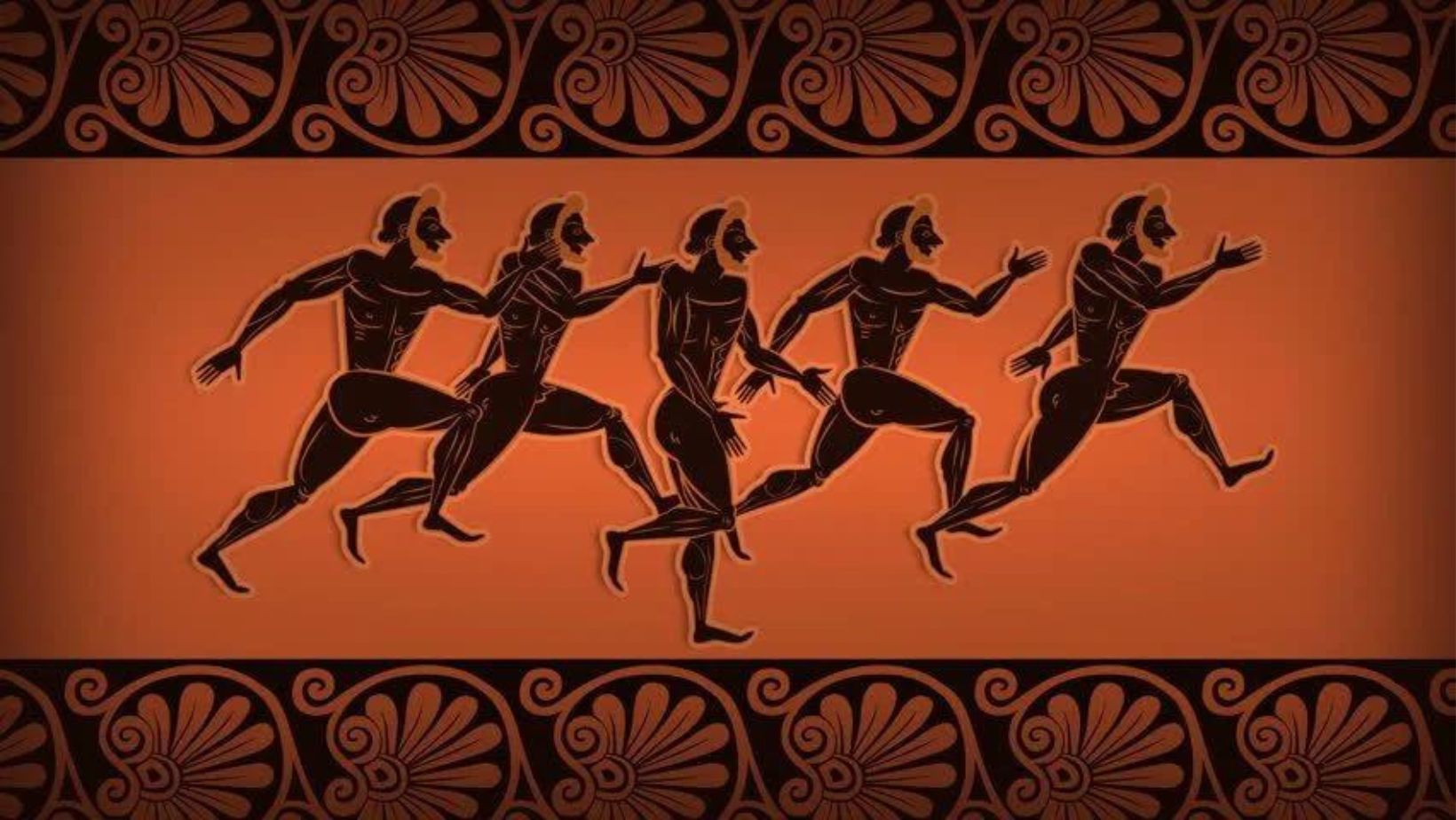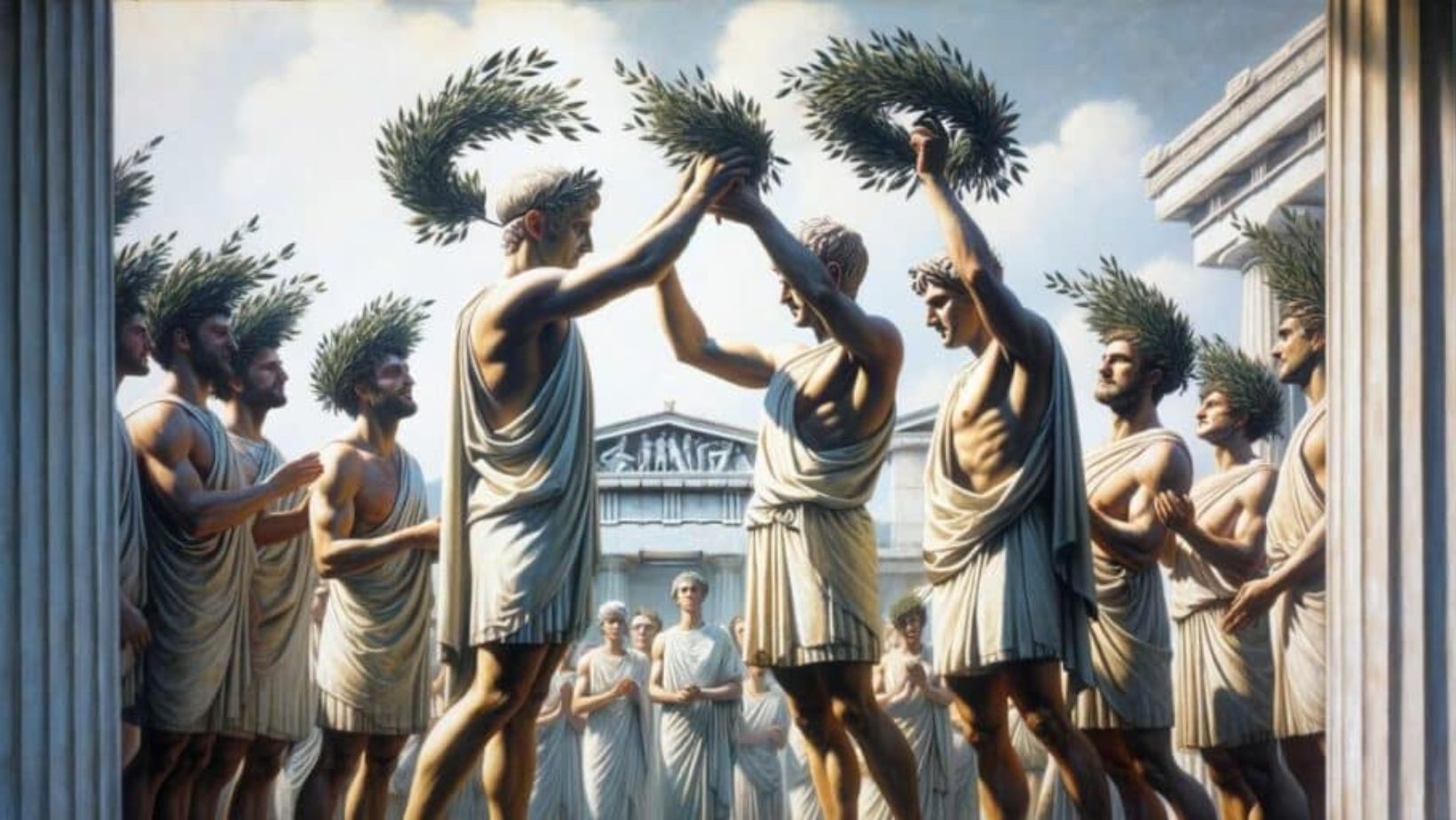Have you ever caught yourself thinking about what really kicked off the whole modern sports scene? The answer lies within the ancient stadiums, where olive wreaths crowned champions under strict yet fascinating guidelines. Yes, we’re talking about “Ancient Olympic Games rules” – a testament to discipline, prowess, and tradition that laid down the very foundation of today’s competitive spirit. Imagine athletes from all over Greece gathering in Olympia, not just to compete but to honor their gods and achieve eternal glory.
This wasn’t merely sport; it was a ritual with standards as high as Mount Olympus itself. From chariot races thundering across dusty tracks to wrestlers grappling in pursuit of victory without boundaries – every event held significance far beyond physical strength or speed.
Table of Contents:
- Ancient Olympic Games Overview
- Rules and Regulations of the Ancient Olympics
- Training and Preparation for Ancient Olympic Athletes
- Notable Athletes and Champions of the Ancient Olympics
- Evolution of the Ancient Olympic Games
- Conclusion
Ancient Olympic Games Overview: Ancient Olympic Games Rules

The ancient Olympic Games were a big deal in ancient Greece.
They were the sporting, social and cultural highlight of the calendar for almost 12 centuries. Full of blood, passion and extraordinary feats of athletic endeavour.
Mythical History of the Games
Legend has it that Heracles (the Roman Hercules), son of Zeus, founded the Games. By the end of the 6th century B.C, they had become the most famous of all Greek sporting festivals.
The ancient Olympics were celebrated for over a millennium. They served as inspiration for the modern competition we know today.
Events and Training
The ancient Olympic Games started as a one-day event in 684 BC. They were then extended to three days.
In the 5th century B.C., the Games were extended again to cover five days. The ancient Games included running, long jump, shot put, javelin, boxing, pankration, and equestrian events.
As today, athletes specialized in certain events. They worked intensively with professional trainers.
Prizes for the Games: Ancient Olympic Games Rules
Highlights from The Met collection illustrate the many athletic games held in ancient Greece. They featured celebrity athletes, grand prizes, and the mythical origins of the first Olympics.
Surviving inscriptions and literary sources list the names of about eight hundred ancient Olympic champions. The first recorded victor was Koroibos of Elis, who won the stadion (footrace) in 776 B.C.
Rules and Regulations of the Ancient Olympics: Ancient Olympic Games Rules
The ancient Olympics had some interesting rules and regulations. Some of them might surprise you.
Athlete Eligibility and Participation
All free Greek males were allowed to take part, from farmhands to royal heirs. But the majority of Olympians were soldiers.
Women could not compete or even attend. There was, however, a loophole to this misogynistic rule.
Chariot owners, not riders, were declared Olympic champions. Anyone could own a chariot. Kyniska, daughter of a Spartan king, took advantage of this, claiming victory wreaths in 396 B.C. and 392 B.C.
Combat sports were brutal. There were no weight classifications or point scoring.
Boxers were urged to avoid attacking the on-display male genitals. There were no rounds or time limits. Contests ended when one fighter was knocked out or admitted defeat.
Pankration was a vicious combination of wrestling and boxing. Only biting and eye gouging were banned.
Judging and Officiating: Ancient Olympic Games Rules
Judges oversaw the games to ensure fair play.
Corporal punishment awaited those guilty of a false start on the track. Fines were imposed on those who bribed opponents or judges.
Training and Preparation for Ancient Olympic Athletes: Ancient Olympic Games Rules
The training and preparation for ancient Olympic athletes was intense. It required great discipline and commitment.
The ancient Greeks believed a healthy body was very important. Both men and women practiced various sports, such as running, wrestling, long jump and swimming.
Athletes specialized in certain events. They worked intensively with professional trainers to perfect their technique.
Mental Preparation Techniques
In addition to physical training, mental preparation was also important. Athletes used visualization techniques to prepare themselves mentally.
They would imagine themselves performing their sport to perfection. This helped them build confidence and stay focused under pressure.
Role of Coaches and Trainers: Ancient Olympic Games Rules
Coaches and trainers played a vital role in an athlete’s preparation. They designed training programs and provided guidance on technique, strategy and mental preparation.
A famous example is Melankomas of Caria. He became a great favorite of ancient commentators for his infinite skill in not only avoiding punches but also refusing to strike his opponent.
Notable Athletes and Champions of the Ancient Olympics: Ancient Olympic Games Rules
The ancient Olympics had no shortage of superstars. Many went on to become legends in the sporting world.
Koroibos of Elis was the first recorded Olympic champion. He won the stadion (footrace) in 776 B.C.
Milo of Croton was one of the most famous athletes. He won the wrestling competition six times. Legend has it he carried a bull on his shoulders and ate it all in one day.
Diagoras of Rhodes was perhaps the most successful Olympic family. His three sons all won Olympic titles in boxing and he was celebrated throughout Greece.
Legacy and Impact on Ancient Greek Society
The victors became heroes. They were seen as being touched by the gods.
They would return home to a hero’s welcome. Poets would write odes to their achievements. Statues would be built in their honour.
Their legacy lived on long after their death. Their stories continue to inspire us to this day.
Evolution of the Ancient Olympic Games: Ancient Olympic Games Rules

The ancient Olympics weren’t a static event. They constantly evolved and changed over time.
The ancient Olympic Games were initially a one-day event until 684 BC. They were then extended to three days.
In the 5th century B.C., the Games were extended again to cover five days. More events were added over time, such as boxing and chariot racing.
The rules also changed. For example, the pentathlon was added in 708 BC, which consisted of five events: running, long jump, discus throw, javelin throw and wrestling.
Influence on Modern Olympic Games
The ancient Olympics served as the inspiration for the modern Olympic Games.
Baron Pierre de Coubertin, the founder of the International Olympic Committee, was heavily influenced by the ancient Games. He admired the ideals of sportsmanship and fair play that were central to the ancient Olympics.
Today’s Olympics continue this spirit in the form of a resolution adopted by the United Nations entitled “Building a peaceful and better world through sport and the Olympic ideal.”
The ancient Olympics may have ended centuries ago, but their legacy lives on to this day.
Key Takeaway: Ancient Olympic Games Rules
Dive into the ancient Olympic Games: a blend of sport, culture, and legend that shaped modern competition. From brutal combat sports with no weight classes to intense training regimens and the fascinating loophole that let women claim victory through chariot ownership. Discover how these games evolved over centuries, inspiring today’s Olympics with ideals of sportsmanship and fair play.
Conclusion: Ancient Olympic Games Rules
The echo from Olympia still resonates today; those “Ancient Olympic Games rules” weren’t just regulations—they were chapters in a larger story about humanity’s quest for excellence and unity through competition. It showed us that even back then, individuals strove not only for personal triumph but also for something greater than themselves—a legacy carved out with sweat on sacred grounds.
So next time you watch an athlete stand proud on the podium or cheer at your screen during nail-biting finishes remember—it all started somewhere grander than we can imagine—underneath starry skies watched by gods who whispered winds of fortune upon mortals daring enough to dream big.

